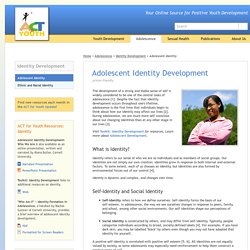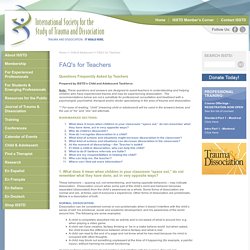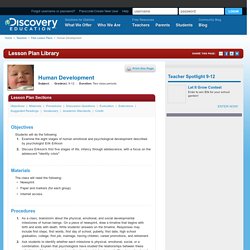

McLean 05 late adol mng copy. Identities Chapter 1: Alone, a kim possible fanfic. Chapter 1 – Alone (edited 06.24.11) That hurt.

Damn that really hurt. Yet I keep running. I've got a job to do, and the sky be damned I will see it done. I'm not really cut for this stuff, y' know? Nothing, that's why. When you've got nothing left you've got nothing to lose. So I keep running. I can see it now. Oh, how the mighty have fallen. It doesn't matter. They don't expect me. I don't matter. That's why I can do it. Slipping past the security grid is a joke. The path is downward. Finally I've reached my destination. I drop myself to the ground without a noise. "Hello sidekick. " Foolproof, indeed. What was I thinking? "Where's Princess? " Not here and you know it, bitch. "Oh, right. Right. "You came alone? Cultural and Societal Influences on Adolescent Development. Adolescent & School Health. ACT for Youth - Adolescence - Adolescent Identity Development.
The development of a strong and stable sense of self is widely considered to be one of the central tasks of adolescence [1].

Despite the fact that identity development occurs throughout one's lifetime, adolescence is the first time that individuals begin to think about how our identity may affect our lives [2]. During adolescence, we are much more self-conscious about our changing identities than at any other stage in our lives [3]. Visit Toolkit: Identity Development for resources. Learn more about Adolescent Development. What is Identity? Identity refers to our sense of who we are as individuals and as members of social groups. Identity is dynamic and complex, and changes over time. Self-Identity and Social Identity Self-identity refers to how we define ourselves. Dimensions of Identity Many dimensions of our identity intersect to form our sense of self and cannot be separated from one another.
Let's look at an example of how social context may influence one's internal sense of identity. Adolescent identity resource. Content. Identity and bi-cultural development. Identity Crisis/ Identity Formation. Adolescence: Crash Course Psychology #20. Erik Erikson’s Identity Crisis: Who am I? Adolescence. FAQ's for Teachers. Prepared by ISSTD’s Child and Adolescent Taskforce Note: These questions and answers are designed to assist teachers in understanding and helping children who have experienced trauma and may be experiencing dissociation.

The recommendations below are not a substitute for professional consultation and treatment with a psychologist, psychiatrist, therapist and/or doctor specializing in the area of trauma and dissociation. ** For ease of reading, “child” (meaning child or adolescent) will be used in the answers below, and the use of “he” and “she” will alternate. These behaviors -- spacing out, not remembering, and having opposite behaviors – may indicate dissociation. Dissociation occurs when some part of the child’s mind and behavior becomes separated (dissociated) from the child’s awareness as a whole. Some forms of dissociation are normal and are, at times, part of everyone’s experience.
These reminders are called “triggers”. Some examples are: Human Development. AdolescenceDefinition: The period of life from puberty to maturity; usually occurs during a person's teen years.Context: According to Erik Erikson's theory,adolescenceis the fifth major stage of a person's life. identity crisisDefinition: Role confusion, or an uncertainty about one's place in society and the world.Context: Erikson believed that one'sidentity crisisfirst occurred during adolescence and was the most significant conflict a person would face. psychoanalysisDefinition: A method of analyzing and treating mental illness that involves treatment sessions, during which the patient is encouraged to talk freely about personal experiences, particularly those during childhood.Context: Austrian physician Sigmund Freud is considered the founder of modernpsychoanalysis. psychologyDefinition: The science or study of mind and behavior.Context: After developing his theory of human development, Erik Erikson became renowned as an expert onpsychology.

Adolescent identities.